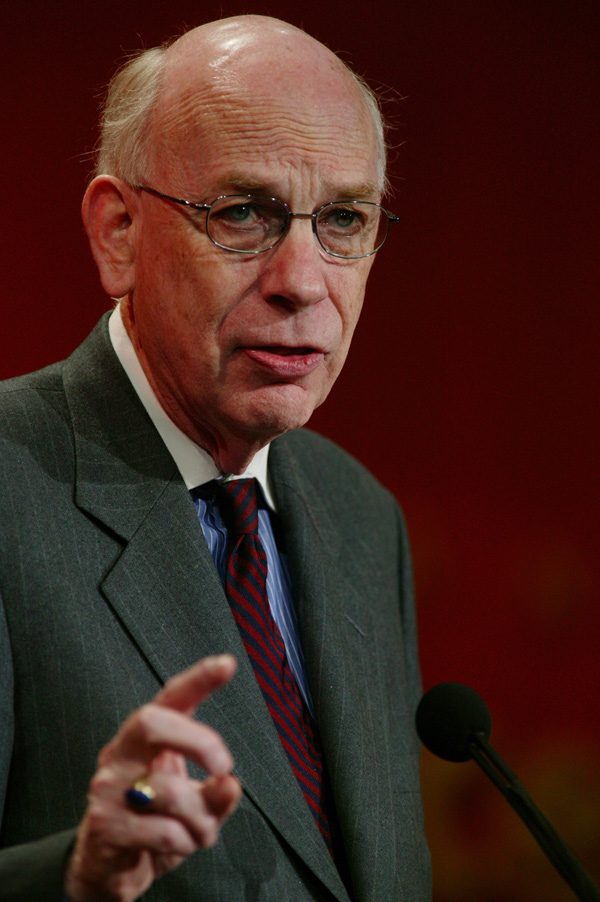Republicans and Democrats are unanimous: the end of Bob Bennett’s career is a loss for the Senate–perhaps for the country. In fact, it is with almost a sense of reluctance that GOP leaders say they’ll support the eventual winner of the Republican primary in Utah–likely a Tea Party-backed insurgent candidate with no experience in politics.
Part of that sentiment, no doubt, has to do with the myopic and inward-looking culture of the Senate itself. Bennett, for better or worse, was part of the club, and the club protects its own. But Bennett–no centrist, he–was, by all accounts ousted thanks to conservative anger over of a handful of instances in which he worked with Democrats, or cast difficult, but perhaps necessary, votes. He voted for TARP, for instance, and he co-authored a far-reaching health care reform bill with Sen. Ron Wyden (D-OR).
And that–the fact that Bennett lost because he was at times willing to legislate–perhaps more than anything else underlies the bipartisan mourning. “I wanted to express…my regrets over the decision made in Utah over the weekend about our colleague, Bob Bennett,” Sen. Chris Dodd (D-CT) said on the Senate floor this afternoon.”
“We have differences of opinion on a lot of policy questions,” Dodd went on. “In fact, the majority of policy questions…. But at critical moments, Bob Bennett was always someone you could talk to, always someone you could approach with an idea or issue. And he went through a tough battle over the last number of weeks and did not prevail in his convention in Utah over the weekend….”
“In my view,” Dodd concluded, “it will be a loss for the institution he won’t be back here.”
This past Thursday, Democrats agreed to delay a vote on a popular amendment to require a thorough audit of the Federal Reserve, in part to protect Bennett–who was in Utah at the time–from criticism ahead of his weekend convention.
Republicans are reluctant to admit that the base’s reaction to Bennett–who was, at the end of the day, a fairly orthodox conservative–troubles them. But unanimously they regret that he lost the nomination.
“Not having Bob Bennett is a real loss to the Senate because he not only is a strong conservative, he is broad gauged and thoughtful and experienced and very diligent in his work, and I think he’s represented Utah well,” Lamar Alexander (R-TN), the third ranking Republican in the Senate, told me this afternoon. “It’s always dangerous to speculate on why people make decisions in an election. Only the people of UT know why they decided not to send him back, and it would be hard for me from a distance to make any judgment on that.”
“I’m very saddened by his defeat,” Sen. Susan Collins (R-ME)–a moderate Republican who’s also known to work with Democrats on certain issues–told reporters this afternoon. “Sen. Bennett is an extraordinary senator who does what he thinks is right and has contributed greatly to our country and served his state well. So I’m disappointed in the decision that was made.”
Like Alexander, though, Collins sought to downplay the extent to which voters rejected Bennett’s record. “I don’t read a great deal into his defeat because Utah has such an unusual system for choosing the party nominee,” Collins said. “I believe that had the nominee been chosen from a primary that Sen. Bennett would have prevailed.”
These sentiments were echoed by Senate Minority Whip Jon Kyl, and by NRSC chairman John Cornyn who prefaced his statement announcing his support for the eventual Republican nominee from Utah with a paean to Bennett. “I commend my colleague Bob Bennett for his tremendous service to the people of Utah during his 17 years in the United States Senate, and I thank him for his professionalism, integrity, and friendship,” Cornyn said. “Senator Bennett has long exemplified the strong values and deep work ethic of his state, and he has fought tirelessly for lower taxes and limited government on behalf of Utah’s best interests.”
Cornyn’s right about Bennett’s record. And that has both Democrats and Republicans asking themselves, If Bennett’s not Republican enough for the Republican base, what will the incoming crop of conservatives be like. In an interview this evening, I asked Lincoln Chafee–a one-time Republican senator, now running for governor of Rhode Island as an independent–what Bennett’s loss says about the state of the GOP. No longer a sitting senator, or a Republican, Chaffee was able to speak his mind more candidly.
“It’s true that many–particualrly in the Republican party lately–fear these primaries,” Chaffee told me. “I went through one in ’06. Republicans up in Maine have to worry about primaries from the right.”
“Orrin Hatch, I remember him telling me, ‘man that Utah system, that’s very very difficult.’ And I think that he survived by one or two votes a couple of times,” Chaffee recalled. “I remember Jim DeMint telling me about those SC primaries and him saying the angriest voices are the ones that stand out in those primaries…. You’re always looking over your shoulder to the primary.”
Chafee recounted a Republican-led effort under the Bush administration to amend the Constitution to ban flag burning. It failed by one vote in the Senate. He, Mitch McConnell, and Bennett were the only three Republicans to buck their party. Chafee says that was “absolutely” a tough vote for Bennett to cast, and called him a hero for it. Absolute deference to the base, he said, is a systemic problem.
“That doesn’t lead to good governing.”










